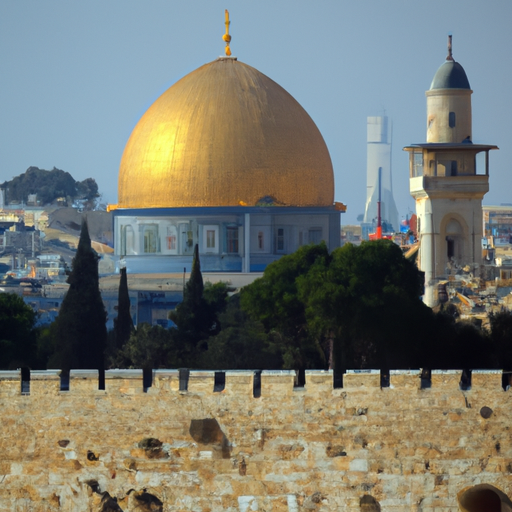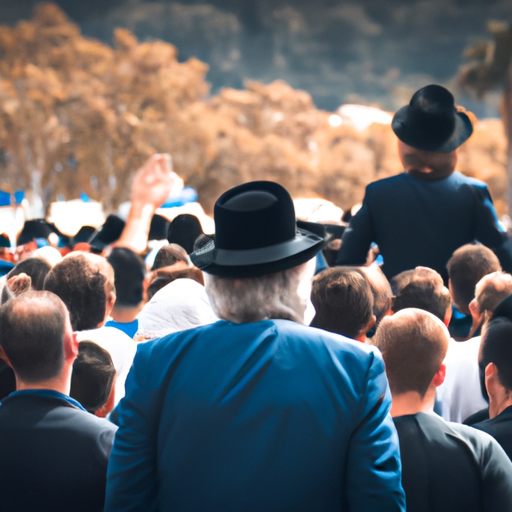This blog post explores the complex landscape of religion and spirituality in Israel, a country with a rich history of diverse religious beliefs and practices. We delve into the fundamental aspects of the major religions, their historical roots, and their influence on the cultural, political, and social life in Israel.
1. The Three Pillars: Judaism, Islam, and Christianity
Judaism, the oldest of the three major monotheistic religions in Israel, serves as the foundational pillar of the country’s spiritual landscape. With a rich history dating back thousands of years, Judaism permeates every aspect of Israeli society, shaping cultural traditions, ethical values, and religious practices. The Western Wall in Jerusalem stands as a powerful symbol of Jewish faith and resilience, drawing pilgrims and worshipers from around the world to pray and connect with their heritage. Synagogues and religious schools dot the Israeli landscape, providing spaces for communal worship and education in the Jewish faith.
Islam, the second-largest religion in Israel, holds a significant place in the country’s religious tapestry. The Al-Aqsa Mosque in Jerusalem, one of the holiest sites in Islam, serves as a focal point for Muslim worshipers and a symbol of spiritual devotion. The call to prayer echoes across the city, inviting believers to gather in mosques for daily prayers and communal worship. Islamic traditions and practices, such as fasting during Ramadan and pilgrimage to Mecca, are observed by millions of Muslims in Israel, reinforcing their spiritual connection to the wider Muslim world.

1. A photo of the Western Wall, the Dome of the Rock, and the Church of the Holy Sepulcher showcasing the three major religions in Israel.
2. ‘Is there a unifying spiritual thread among the diverse religions in Israel?’
While the religions in Israel may differ in their beliefs, practices, and historical narratives, there exists a unifying spiritual thread that transcends these differences. At the core of Judaism, Islam, and Christianity lies a shared reverence for the sacred land of Israel, a region steeped in religious significance and historical importance for followers of all three faiths. This common spiritual bond manifests in the shared pilgrimage sites, such as Jerusalem, Bethlehem, and Nazareth, which hold deep meaning for Jews, Muslims, and Christians alike. The interconnectedness of these holy sites serves as a reminder of the shared heritage and spiritual interconnectedness among the diverse religious communities in Israel.
Moreover, the ethical teachings and moral values espoused by Judaism, Islam, and Christianity provide another unifying factor that transcends religious boundaries. Concepts such as compassion, justice, charity, and respect for others are fundamental tenets of all three religions, guiding believers in their daily lives and interactions with others. These universal values serve as a moral compass for individuals across different faith traditions, fostering a sense of unity and shared purpose in striving towards a more just and equitable society. Despite theological differences, the emphasis on ethical living and social responsibility serves as a common ground for dialogue and cooperation among the diverse religious communities in Israel.
3. The Influence of Religion on Israel’s Politics and Society
Religion plays a significant role in shaping the dynamics of politics and society in Israel, where the intertwining of religious beliefs with state affairs has profound implications for governance and social cohesion. The religious diversity in Israel, with Judaism as the predominant faith, influences political decision-making, legislation, and public policy, reflecting the complex interplay between religion and state.
Religious institutions and leaders wield considerable influence in shaping public opinion and mobilizing support for various political agendas, often aligning themselves with specific political parties or movements that champion their religious interests. This close relationship between religion and politics can both empower and polarize society, as differing interpretations of religious teachings can fuel ideological divisions and social tensions.
Furthermore, the influence of religion extends beyond the realm of politics to impact various aspects of Israeli society, including education, family life, and cultural norms. Religious traditions and practices are deeply ingrained in the fabric of Israeli society, shaping individual identities and community dynamics. The adherence to religious laws and customs, such as kosher dietary restrictions and observance of religious holidays, reflects the enduring influence of religion on daily life in Israel.
While religion serves as a source of unity and identity for many Israelis, it also poses challenges in promoting inclusivity and tolerance in a diverse society. Striking a balance between religious freedom and secular values remains an ongoing debate in Israel, highlighting the complex relationship between religion, politics, and society in the country.

3. A photo of a political rally in Israel showcasing the influence of religion on politics.
4. ‘Can religion be a bridge or a barrier in Israel?’
Religion in Israel has the potential to act as both a bridge and a barrier, depending on how it is interpreted and practiced within the diverse society. On one hand, religion serves as a unifying force that can bring together individuals from different faith traditions, fostering a sense of shared values, community, and identity. Interfaith dialogue and cooperation among religious groups can promote understanding, tolerance, and mutual respect, serving as a bridge to bridge divides and promote harmony in Israeli society.
However, religion can also be a barrier that divides communities along religious lines, exacerbating existing tensions and fueling conflicts. The deep-seated religious beliefs and historical narratives of different faith communities in Israel can create barriers to dialogue and reconciliation, hindering efforts to build trust and cooperation across religious divides. Extremist interpretations of religious teachings can further polarize society, leading to discrimination, violence, and social fragmentation.
Navigating the complex role of religion as a potential bridge or barrier in Israel requires a delicate balance between upholding religious freedoms and promoting secular values that safeguard the rights and dignity of all individuals. Emphasizing commonalities and shared values among diverse religious groups can help build bridges of understanding and cooperation, fostering a more inclusive and cohesive society. Ultimately, the challenge lies in harnessing the positive aspects of religion while mitigating its potential to serve as a barrier to unity and peace in Israel.
Religion and spirituality in Israel are deeply intertwined with the country’s history, culture, and politics. The diversity of religious beliefs, practices, and spiritual traditions is a testament to Israel’s rich history and its role as a meeting point for different civilizations. Despite the complexities and conflicts, the shared sacred spaces and the mutual influence among these religions paint a unique picture of peaceful coexistence and spiritual richness.
